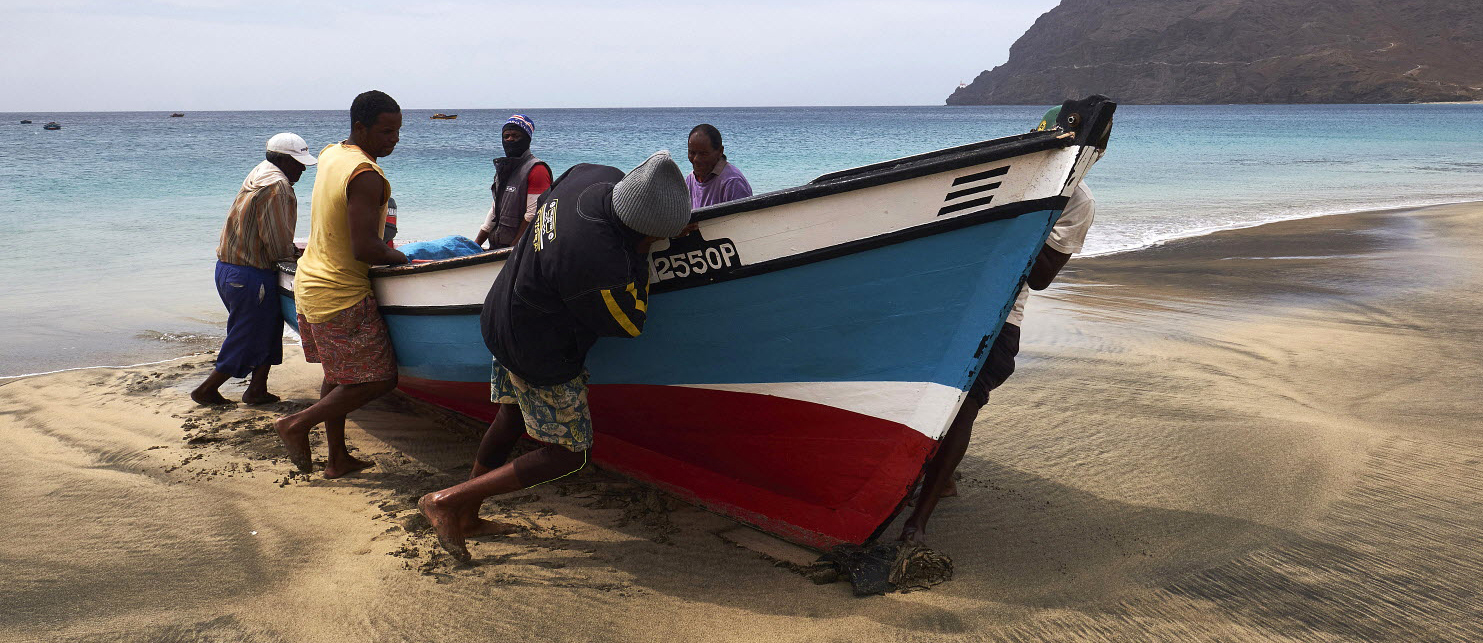Country Programme Evaluation of FAO in Cabo Verde
The main purpose of this evaluation is to draw lessons from the implementation of the 2018–2022 Country Programme Framework and formulate recommendations to the Country Office for the development of the new Country Programming Framework (CPF) cycle.
The CPF guides FAO’s collaboration with Cabo Verde through jointly identified priority areas. The current CPF covers the period 2018–2022 and is structured around the following priority areas:
- Strengthen governance of food and nutrition security, ensuring that the most vulnerable groups benefit from protection and social inclusion policies.
- Increased working population’s income through transformation and growth in key economic sectors such as the Green Economy and the Blue Economy.
- Integrated and innovative approaches for sustainable and participatory natural resource management are developed and implemented.
What does the evaluation cover?
The evaluation is designed to assess the totality of FAO’s work in Cabo Verde during 2018–2022, focusing on the following points:
- relevance and appropriateness of FAO’s interventions, capacities, and resources in relation to the country’s priorities and needs, and in the context of UNDAF
- FAO’s comparative strengths and weaknesses to support the country within the areas of its mandate, and in the context of UNDAF
- vertical and horizontal coherence of FAO’s interventions in the country, including between humanitarian and development activities
- efficiency and effectiveness of FAO’s interventions, capacities, resources, and mechanisms in contribution to the three priority areas identified in the CPF
- integration of cross-cutting issues such as gender, climate change, governance, human capital, technology, data, and innovation into FAO’s interventions.
The evaluation also identifies good practices, causes of successes and failures, and areas of work for the next CPF.
Recommendations
Recommendation 1. The CPF 2023–2027 should include a structured narrative showing its coherence with the overall strategic framework of the country (SDGs, national plans). Priority should be given to completing and sustaining the ongoing programmes in areas such as food security governance, resilience, blue economy, agricultural research and rural extension, and sustainable natural resources management/climate change adaptation. Specific projects and initiatives should be coherent with CPF programmes and outcomes and foster interconnection and intercomplementarity.
Recommendation 2. The evaluation recommends supporting the improvement and consolidation of food and nutrition security governance by addressing some critical issues, notably:
i) the need for a new National Strategy of Food and Nutrition Security (ENSAN) in the perspective of the 2030 Agenda, and specifically SDG 2;
ii) the need for a more effective interinstitutional approach and coordination, particularly addressing the role of the FNS Secretariat; and
iii) the need for a more incisive and inclusive mechanism for stakeholder participation and decision-making through the FNS National Council.
Recommendation 3. It is recommended that national and community capacity of risk preparedness and management be improved and resilience responses to emergencies in rural communities affected by recurrent drought years be strengthened. It is suggested to:
i) strengthen and replicate the promising pilot initiative of the caisses de résilience;
ii) enhance adaptation measures to improve the resilience of rainfed agriculture and livestock breeding; and
iii) develop an integrated and multisector approach to rural development through alternative sources of income.
Recommendation 4. The evaluation recommends to improve and strengthen the link between agricultural research, capacity building and rural extension through:
i) a structured and joint capacity development programme of the Research Institute and the Extension Service based on the priorities identified in the Strategic Plans of the two institutions and on the need to increase outreach, effectiveness and monitoring capacity in all districts and islands;
ii) promoting and reinforcing joint programmes such as the integrated pest management, climate-smart agriculture
and nutrition-sensitive agriculture, and caisses de résilience, among others; and
iii) increased joint efforts to support livestock breeding and agroforestry.
In the perspective of the above priorities, it is strongly recommended to enhance the national capacity of upgrading and upscaling the existing farmer field schools programme, as a key methodology to link research, training and extension.
Recommendation 5. It is strongly recommended that FAO, in combination with other UN agencies, support the Ministry of the Sea to conceive and implement a coordinated, comprehensive and harmonized national capacity development programme for the smooth and effective transition of the country to the blue economy. It is specifically recommended to FAO to reinforce its support to the sectors of small/artisanal fishery and of coastal fishery, with a particular focus on the effective and equitable inclusion of coastal communities, particularly women groups and young unemployed people, in the blue economy.
Recommendation 6. It is recommended to ensure continuity and completion to the strengthening of the adaptive capacity and resilience of the forestry sector in Cabo Verde, given the increased risks posed by climate change and land desertification. In this perspective, it is strongly recommended to FAO and key national stakeholders to:
i) encourage and strengthen the interinstitutional and participatory approach to capacity development promoted through the thematic working groups set by the Reflor project;
ii) continue efforts to include rural communities in the co-management of forested areas, by accelerating the revision and approval of necessary regulatory instruments and the process of community participation; and
iii) promote more sustainable and effective linkages between climate change adaptation measures and the resilience and economic empowerment of rural communities.
It is suggested to combine the cash for work approach with the setting of saving and credit and with alternative income-generating activities.
Recommendation 7. It is recommended, in coordination with other UN and bilateral cooperation agencies as well as international NGOs present in the country, to conceive and implement a comprehensive capacity building and development programme addressing the improvement and consolidation of civil society organizations, hence making more substantive and effective their participation in planning and implementation of development projects and programmes. It is equally recommended that FAO enhance its coordinating role in the Planet Agenda of the UNSDCF, with a particular focus on the UN Task Force regarding the blue economy.

